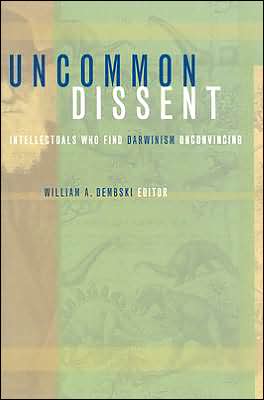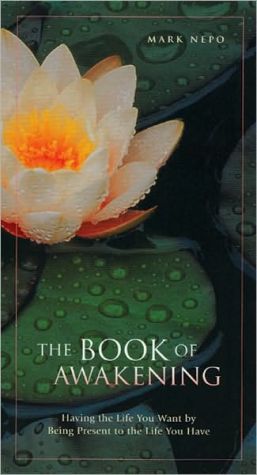Uncommon Dissent: Intellectuals Who Find Darwinism Unconvincing
Recent years have seen the rise to prominence of ever more sophisticated philosophical and scientific critiques of the ideas marketed under the name of Darwinism. In Uncommon Dissent, mathematician and philosopher William A. Dembski brings together essays by leading intellectuals who find one or more aspects of Darwinism unpersuasive. As Dembski explains, Darwinism has gathered around itself an aura of invincibility that is inhospitable to rational discussion—to say the least: "Darwinism, its...
Search in google:
Recent years have seen the rise to prominence of ever more sophisticated philosophical and scientific critiques of the ideas marketed under the name of Darwinism. In Uncommon Dissent, mathematician and philosopher William A. Dembski brings together essays by leading intellectuals who find one or more aspects of Darwinism unpersuasive. As Dembski explains, Darwinism has gathered around itself an aura of invincibility that is inhospitable to rational discussion—to say the least: "Darwinism, its proponents assure us, has been overwhelmingly vindicated. Any resistance to it is futile and indicates bad faith or worse." Indeed, those who question the Darwinian synthesis are supposed, in the famous formulation of Richard Dawkins, to be ignorant, stupid, insane, or wicked.The hostility of dogmatic Darwinians like Dawkins has not, however, prevented the advent of a growing cadre of scholarly critics of metaphysical Darwinism. The measured, thought-provoking essays in Uncommon Dissent make it increasingly obvious that these critics are not the brainwashed fundamentalist buffoons that Darwinism s defenders suggest they are, but rather serious, skeptical, open-minded inquirers whose challenges pose serious questions about the viability of Darwinist ideology. The intellectual power of their contributions to Uncommon Dissent is bracing. William A. Dembski is associate research professor in the conceptual foundations of science at Baylor University and a senior fellow with Discovery Institute s Center for Science and Culture in Seattle. The author of numerous articles on intelligent design and mathematical, philosophical, and theological matters, his books include The Design Inference: Eliminating Chance through Small Probabilities and No Free Lunch: Why Specified Complexity Cannot Be Purchased without Intelligence. John Wilson is the founding of the bimonthly review, Books & Culture, and an editor at large for Christianity Today. Library Journal In this earnest volume, mathematician and philosopher Dembski oversees an intellectual critique of Darwinism. By that, most of the contributors are referring to what they consider a bankrupt materialistic ideology; almost all are operating from a theistic worldview, in which any account of life's origins must involve purpose and design. Naturally, two authors of popular works who espouse extremely reductive and atheistic views, Richard Dawkins and Daniel Dennett, are lightning rods for repeated criticism here. Both camps rely on opposing sets of first principles for their ontological systems, which are painfully obvious to them but not to the other side. One of the book's inadvertent strengths is its illustration of the inextricable linkage of the teleological and naturalistic worldviews in the Western tradition. One contributor, Christopher Michael Langan, begins to move abstrusely toward overcoming the logical bind that they have with one another. Otherwise, the book merely trots out many timeworn and unconvincing criticisms of evolutionary biology. Recommended only as a contemporary exemplar of several species of argument and a minor contribution to the history of ideas. Walter L. Cressler, West Chester Univ. Lib., PA Copyright 2004 Reed Business Information.
Uncommon Dissent\ Intellectuals Who Find Darwinism Unconvincing \ \ ISI Books\ Copyright © 2007 William A. Dembski\ All right reserved.\ ISBN: 978-1-932236-31-6 \ \ \ \ Foreword\ John Wilson \ For years now, the New York Review of Books has been sending a direct-mail letter that asks-in bright red letters-"Are you an intellectual?" I was glad to see that the subtitle of Uncommon Dissent is Intellectuals Who Find Darwinism Unconvincing. "Intellectual" is a perfectly good noun that has fallen on hard times, particularly among conservatives, where it is almost always used pejoratively.\ An intellectual may be, but is not necessarily, a specialist. Not all academics are intellectuals; not all intellectuals are academics. To be an intellectual is to possess a hungry mind and a willingness to question received opinion. But, contrary to a fashionable perversion of the intellectual's calling, intellectual is not a synonym for skeptic. Healthy skepticism is indeed essential to the intellectual life, but it must not become an end in itself. There is a reality to which we are all accountable, a reality that invites our understanding.\ Since you have picked up Uncommon Dissent, there's a good chance that you would have to answer yes to the NYRB's question. And you may already know that the book you're holding is dangerous; it may get you into trouble. By questioning Darwinism, you place yourself in the company of all the cranks who have violated the taboos enforced by our current opinion-makers.\ In many settings, the contempt of the enlightened won't affect you. If, however, you are teaching at a college or university, the costs may be considerable. (False dramatics? Not at all. The art of blackballing is practiced with great skill and ruthlessness in academia.)\ Of course, the ferocity of resistance merely underlines the need for informed dissent. The almost comically hyperbolic arrogance of the Darwinian establishment, well documented in William Dembski's introduction to this volume, is representative of a larger malaise. As Steve Fuller observes in his new book, Kuhn vs Popper: The Struggle for the Soul of Science,\ Popper's view that a non-scientist might criticize science for failing to abide by its own publicly avowed standards is rarely found inside academia today. For those who have inherited Kuhn's Cold War belief that normal science is a bulwark in a volatile world, it comes as no surprise that philosophers today would sooner criticize creationists for violating evolutionary strictures than evolutionists for violating more general scientific norms-an activity for which Popper had been notorious.\ But there's another, subtler danger to which almost every reader of this book is potentially vulnerable. The role of dissenter can be costly, but it can also be powerfully seductive. How easy it is, after reading a book such as this, to puff oneself up with pride, to wax dogmatic about the "crumbling edifice of evolutionary theory," and to fall into the very arrogance that is characteristic of Darwinism at its worst.\ If you really are an intellectual, and not what Solzhenitsyn calls a "smatterer," you will finish this book with more questions than answers. You won't simply accept the assertions of the authors gathered here, themselves a very diverse bunch; you'll subject them to the same sort of searching critique they have brought to bear on Darwinism.\ You will wonder, for starters, what precisely is meant by "Darwinism"-or "evolution," for that matter, a notoriously slippery word. Is it the notion that life is merely a cosmic accident, the product of chance and natural selection? If so-and that is an essential aspect of the doctrine of some of the most visible proponents of Darwinism-there's no reason not to toss it overboard.\ But what about common descent? "Evolution," Richard Dawkins writes in his introduction to The Best American Science and Nature Writing 2003, "is one of the most securely established facts in all science. The knowledge that we are cousins to apes, kangaroos, and bacteria is beyond all educated doubt." Isn't there abundant evidence that-in this limited but hardly insignificant sense-evolution is real, however open to dispute the adequacy of natural selection as its engine may be? (Even Richard Dawkins is right once in a while.)\ What about scientists like Simon Conway Morris, the distinguished Cambridge paleobiologist whose book Life's Solution: Inevitable Humans in a Lonely Universe argues that the evolution of life reveals a pattern, an underlying direction, in which he finds "the richness of a Creation"? Nothing of this "complexity and beauty," he adds, "presupposes, let alone proves, the existence of God, but all is congruent." Is he right? If so, why? If not, why not? Part of your job as a reader of Uncommon Dissent is to read it in dialogue with books such as Life's Solution or Perspectives on an Evolving Creation, a newly published collection of essays edited by Keith B. Miller.\ Since I have given you the beginnings of a reading list, let me conclude with one of my favorite books on Darwinism-one that is unfairly neglected in the literature. It is a small children's book, Yellow and Pink, written and illustrated by William Steig, who died in the fall of 2003 at the age of ninety-five. Steig, whose cartoons appeared in the New Yorker from 1930 on, was best known for his children's books (including Shrek!, the basis for the hit movie).\ Yellow and Pink was first published in 1984 and was reissued in 2003 just a few months before Steig's death. It is the story, as the opening lines tell us, of "two small figures made of wood, ... lying out in the sun one day on an old newspaper. One was short, fat, and painted pink; the other was tall, thin, and painted yellow." They are wondering how they came to be there-indeed, how they came to exist in the first place.\ Pink looks at his companion-"He found Yellow's color, his well-chiseled head, his whole form, admirable"-and he decides: "Someone must have made us."\ Not so, counters Yellow: "I say we're an accident, somehow or other we just happened." And they begin a debate, each forcefully pressing his case.\ I don't want to reveal the rest of the plot and spoil it for you. But I will say this: on the issue at stake, Steig's little fable is far more penetrating than whole stacks of books that have accumulated in my study. I hope you will put it on your own bookshelf, not far from Uncommon Dissent.\ (Continues...)\ \ \ \ \ Excerpted from Uncommon Dissent Copyright © 2007 by William A. Dembski. Excerpted by permission.\ All rights reserved. No part of this excerpt may be reproduced or reprinted without permission in writing from the publisher.\ Excerpts are provided by Dial-A-Book Inc. solely for the personal use of visitors to this web site. \ \
ForewordIntroduction : the myths of DarwinismPt. IA crisis of confidence1The check is in the mail : why Darwinism fails to inspire confidence32Darwinism as dogma : the establishment of naturalism233The miracles of Darwinism41Pt. IIDarwinism's cultural inroads4Darwin meets the Berenstain Bears : evolution as a total worldview535Teaching the flaws in neo-Darwinism756Accept no imitations : the rivalry of naturalism and natural law997Refereed journals : do they insure quality or enforce orthodoxy?115Pt. IIILeaving the Darwinian fold8A Catholic scientist looks at Darwinisim1339An anti-Darwinian intellectual journey : biological order as an inherent property of matter15310Why I am not a Darwinist177Pt. IVAuditing the books11Why evolution fails the test of science19512Darwinian evolutionary theory and the life sciences in the twenty-first century21513Cheating the millennium : the mounting explanatory debts of scientific naturalism23314The deniable Darwin263
\ Library JournalIn this earnest volume, mathematician and philosopher Dembski oversees an intellectual critique of Darwinism. By that, most of the contributors are referring to what they consider a bankrupt materialistic ideology; almost all are operating from a theistic worldview, in which any account of life's origins must involve purpose and design. Naturally, two authors of popular works who espouse extremely reductive and atheistic views, Richard Dawkins and Daniel Dennett, are lightning rods for repeated criticism here. Both camps rely on opposing sets of first principles for their ontological systems, which are painfully obvious to them but not to the other side. One of the book's inadvertent strengths is its illustration of the inextricable linkage of the teleological and naturalistic worldviews in the Western tradition. One contributor, Christopher Michael Langan, begins to move abstrusely toward overcoming the logical bind that they have with one another. Otherwise, the book merely trots out many timeworn and unconvincing criticisms of evolutionary biology. Recommended only as a contemporary exemplar of several species of argument and a minor contribution to the history of ideas. Walter L. Cressler, West Chester Univ. Lib., PA Copyright 2004 Reed Business Information.\ \








